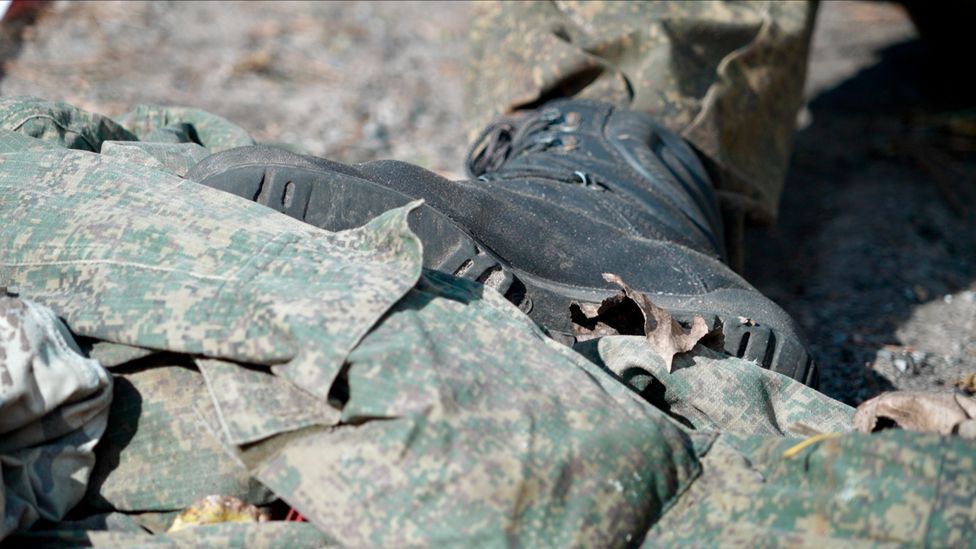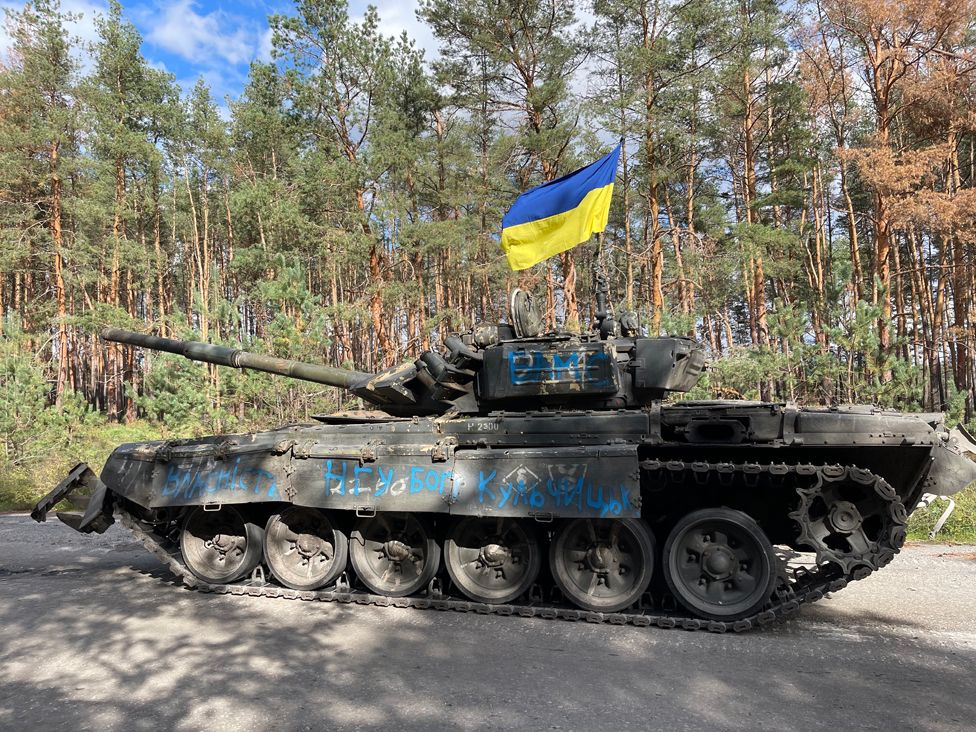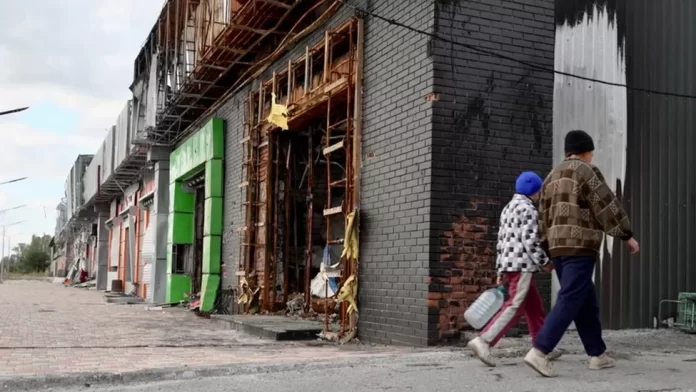It does inside the eastern Ukrainian town of Lyman, retaken from the Russians at the weekend. The deserted debris-strewn streets are lined by boarded up or burnt-out buildings. Metal sheeting dangling from smashed roofs is buffeted by the wind. Few civilians venture out. We counted almost as many dogs as people – though the population was around 20,000 before the war.
The handful of civilians we met seem shell-shocked by months of bombardment, and uncertain their ordeal is over.
The only surge of life was a convoy of Ukrainian troops riding high on top of armoured personnel carriers, waving and cheering, as they headed out of town, along a road bordered by pine forest.
They roared past evidence of the human cost of Russia’s defeat.
The bodies of five dead Russian soldiers lay near each other, now bloated, and contorted by death, but once somebody’s husband or somebody’s son.
They were in full uniform, with boots still on, as if they might somehow return to the fight. They appear to have been cut down together as they tried to flee.
Nearby we saw a heap of discarded Russian uniforms, sleeping bags, and ration packs. There was an army backpack with a name written on it. We don’t know what became of its owner.
Two young volunteers from a Ukrainian humanitarian group were working carefully and quietly, numbering the bodies, and looking for anything that might identify them.
India’s words are anti- war , but New Delhi’s actions are propping up Putin’s regime
Ukraine war: Many dead as rockets hit civilian convoy in Zaporizhzhia
They were kneeling just metres away from mines scattered along the roadside, their dark green colour camouflaged by the grass and leaves. They are a lingering threat from an enemy that has been driven into retreat, or as Russia’s defence ministry put it, was “withdrawn to more advantageous positions”. That statement has a familiar ring to it after the domino of Russian routs last month in Kharkiv province in the north-east.
Later the volunteers manoeuvred the remains into black body bags and drove them away – some of Russia’s fallen soldiers finally leaving the battlefield.

A new Ukrainian flag was flying atop a captured Russian T72 tank, parked by the roadside. “We are going to win,” said the smiling young Ukrainian soldier clambering around the gun turret. “I feel very good, very great.”
What happened here isn’t just a defeat for President Vladimir Putin. It’s a complete humiliation. Just last Friday he announced to the world he was annexing four Ukrainian regions, including Donetsk, where Lyman is located. He proclaimed that they would be “Russian forever”.
A day later Ukrainian forces were inside Lyman, and his troops were running for their lives.
Ukraine says as many as 5,000 Russian troops were encircled in Lyman, before the town fell. We don’t know how many were killed or captured. The defence ministry in Kyiv said in a tweet that almost all the Russian troops deployed to Lyman had been “redeployed either into body bags or into captivity”.
The strategic town is a gateway to the neighbouring region of Luhansk, which is almost entirely in Russia’s grip. Ukraine is hoping to advance further, using its victory here as a springboard.
Lena and her 10-year-old Radion are hoping for peace, and for running water. We met the mother and son heading for a well to refill a five-litre container.
“I think it will be peaceful,” said Lena, who wore a black hat and a few layers of woollen jumpers, “It should be peaceful. Everyone has suffered enough. The hardest thing was to survive the shelling. We prayed as we stayed in the cellar. The situation is still tense but overall, I am happy.”

While deprived of school, Radion has learnt the lessons of war. His face is sombre, beneath his deep blue hat. “It was a bit scary in Lyman,” he tells us “because there was a lot of bombing. War is very bad because people are dying. It’s more peaceful in my heart now.”
Others here still seem lost in their trauma, like 66-year-old Nadia. She was alone on the streets, walking slowly, as if she could not recognise her surroundings.
“I hope for the best,” she said “and that they [the Russians] won’t come back here. It was very bad. Both sides were firing. We didn’t understand anything. When it was quiet, we went outside to cook. Then it started again. We have all gone mad now.”
And she had a question for us.
“Why am I being bombarded?” she beseeched us. “I didn’t do anything bad. I didn’t kill. I didn’t steal. I don’t understand why. Maybe you can tell me. We lived well, everything was good, we worked. And in one moment it was turned upside down.”
In the streets around town pro-Russian slogans have been daubed on walls, kiosks and bus shelters. “CCCP” is daubed on a closed shop front – the Cyrillic letters for USSR, the Union of Soviet Socialist Republics.
Much as President Putin may wish to resurrect the Soviet Union of his youth, the ruins of Lyman stand as testament to his failure.
Ukraine now has momentum and knows it must move fast, Western weapons supplies permitting. Battle lines will harden when freezing weather comes. The window for reclaiming more territory this winter may close in a few weeks.

